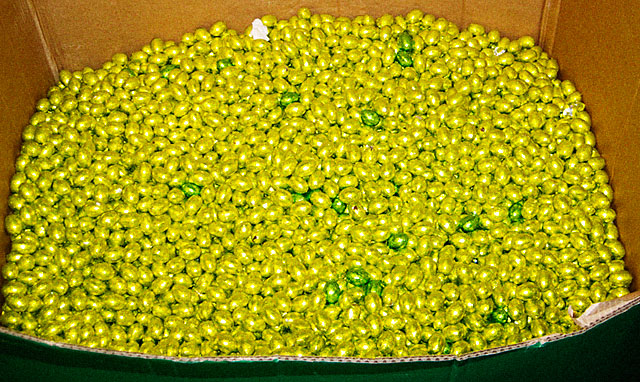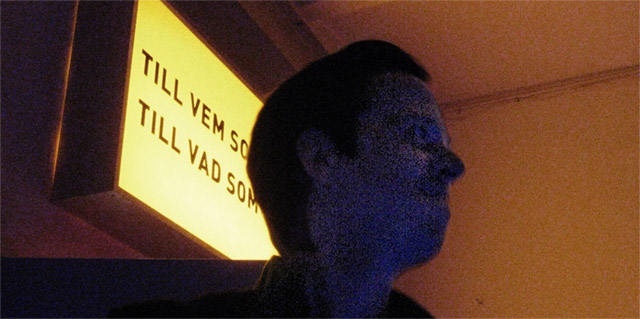We told the R&D guys they could come up with anything they wanted, as long as it could be thrown together from existing ingredients, cost less than 40 cents to make, and looked enough like dog shit that impressionable lardbutts like you would get a food boner the first time its commercial ran on whatever basic cable reality show keeps you from killing yourself for a week.
→ Kung Fu Grippe, Merlin Mann: A new brown thing you’ll totally eat
Crappy Taxidermy is a visual blog dedicated to exploring the bizarre world of taxidermy. The pictures within are exceptional examples of the strange, the grotesque, and the awful. Though our title may say “crappy” we respect the dedication and talent of the taxidermists who created the works pictured within.
→ About: Crappy Taxidermy

I would kindly like to inform you that I’ve been a vegan for ten years. Unless you count the Snickers bars I ate out of economic necessity when living on in Iceland (where vegetables are paid in installments) in which case I have one more year to go before reaching ten. Ok, let’s rephrase: I decided to switch to a vegan diet ten years ago, and initial Snickers bars notwithstanding, I’m doing well.
To recap: When studying in Karlstad I ran a weekly radio show modeled on Frispel (mentioned previously) where I’d put together a one hour show on a whatever topic I pulled out of my arse. I interviewed a dentist who did hypnosis, a priest about the onthological proof of Gods existence, and this one time I started doing one on milk.
I had spoken to a chef who mentioned that unless the lactal enzyme in our guts have a constant supply of lactose, they disappear and you’re left intolerant. This, he argued, explains why proportionally large number of people in parts of the world are lactose intolerant — milk and other dairy isn’t widely consumed and we producing the enzyme as a result
This is more of less accurate. The enzymes are developed by you own body when you’re young, but with age you stop producing them. Supposedly, this is so that we can be breast-fed as babes, but with the anticipation that we stop drinking milk after we’re weened off it. Historically, milk hasn’t been a staple of human diet so intolerance is common. A majority of all adults in the world are lactose intolerant as a result of the stuff just not being in the food chain.

The first dietician I tried to interview scolded me for not knowing the difference between allergy and intolerance, so I plowed through two books on nutrition and health and return two days later for the interview. I called the Swedish Milk Council (Mjölkfrämjanded, a pro-milk lobby. Originally, named “The Swedish Milk Propaganda” — Wikipedia: Mjölkpropagandan) as well as the National Food Administration and had them comment on a study of osteoporosis prevalence among a group of nurses. Seeing as the report was hosted on MilkSucks.com their reaction was predictably not favourable. (I think they criticized poor methodology)
I barely touched on the whole animal rights issue. As so many others I hadn’t given the question much thought, and found the environmental and health aspects of dairy more interesting. Somewhere in the process of doing the show I came to the conclusion that the only environmentally conscientious thing to do was to switch to a vegetable based diet, which also seemed to be a healthy way of eating.
Of course, now I know that “vegetable” doesn’t always equate “environmentally sound” nor necessarily “healthy” if you take processed foodstuffs into account — even skirting the necessity of B12 supplements. If you are an omnivore who eats with moderation you might not experience the adverse effects of cholesterol and whatnot, and locally raised beef might have a smaller environmental impact than a soybean transported halfway across the globe.

The question of food and where it comes from is very complex, and if you are so inclined I encourage you to read the The State of Food and Agriculture 2009, the yearly report from FAO (the Food and Agriculture Organisation of the United Nations) or why not just skim Wikipedia: Environmental effects of meat production. Of course, once these folks get in vitro meat going we might satisfy the tastes of everyone except those bent on organic food.
Having written that, today it’s the animal rights issue which is the deciding factor for me. There’s overwhelming proof that we’re causing suffering and pain to animals directly by using them for food or other products, and there’s secondary misery caused by the environmental impact of rearing animals. You could do worse than to read All animals are equal, by Peter Singer as a more well-put introduction to “animal rights” than I could give.
It took me 21 years before reaching the conclusion that veganism is a step in the right direction, and I don’t remember anyone else influencing me one way or another, so I try not to preach, but every once in a while I get into a debate on animal rights. It can be fun, but is more often a losing proposition, as illustrated by a thread over in Metafilter, where the subject usually turns into an anti-vegan dogpile for some reason: Operation Pancake.
Also, I have a standing bet with a chef friend that if he can make me a human steak out of someone who hasn’t suffered and the eating of which wouldn’t cause anyone grief, I’d eat it. Rather disgusting, but that’s what you get when debating veganism drunk.